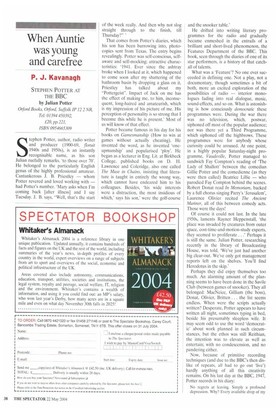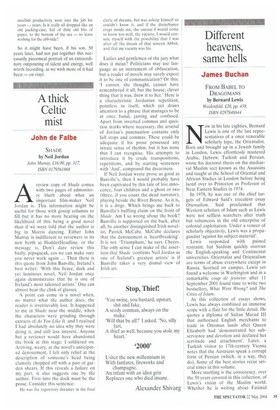When Auntie was young and carefree
P. J. Kavanagh
STEPHEN POTTER AT THE BBC by Julian Potter Orford Books, Orford, Suffolk IP 122 NR, Tel: 01394 450392, £20, pp.221, ISBN 0954665309 Stephen Potter, author, radio writer and producer (1900-69, floruit 1940s and 1950s), is an instantly recognisable name, as his son Julian ruefully remarks, `to those over 70'. He belonged to the particularly English genus of the highly professional amateur. Cantankerous J. B. Priestley — whom Potter revered and loved working with — had Potter's number. 'Mary asks when I'm coming back [after illness] and I say Tuesday. J. B. says, "Well, that's the start
of the week really. And then why not slog straight through to the finish, till Thursday?" ' That comes from Potter's diaries, which his son has been burrowing into, photocopies sent from Texas. The entry begins revealingly. Potter was self-conscious, selfaware and self-mocking; attractive characteristics: '1941. Ever since the ashtray broke when I looked at it, which happened to come soon after my shattering of the bathroom basin by dropping a glass on it, Priestley has talked about my "Pottergeist". Impact of Jack on me has the effect of making me, to him, inconsequent, long-haired and amateurish, which is my impression of his picture of me. His perception of personality is so strong that I become this while he is present.' Most of us will know of that effect.
Potter became famous in his day for his books on Gamesmanship (How to win at games without actually cheating). He invented the word, as he invented 'oneupmanship' and popularised 'ploy'. He began as a lecturer in Eng. Lit. at Birkbeck College, published books on D. H. Lawrence and Coleridge, also one called The Muse in Chains, insisting that literature is taught in entirely the wrong way, which cannot have endeared him to his colleagues. Besides, 'his wide interests were a distraction, the most insidious of which,' says his son,' were the golf-course
and the snooker table.'
He drifted into writing literary programmes for the radio and gradually became enmeshed in the entrails of a brilliant and short-lived phenomenon, the Features Department of the BBC. This book, seen through the diaries of one of its star performers, is a history of that catchall of talents.
What was a 'Feature'? No one ever succeeded in defining one. Not a play, not a documentary, though sometimes a bit of both, more an excited exploration of the possibilities of radio — interior monologues fading into real dialogue, music, sound-effects, and so on. What is astonishing is how consciously democratic these programmes were. During the war there was no television, which, postwar, siphoned off most of the popular audience; nor was there yet a Third Programme, which siphoned off the highbrows. These programmes were for anybody whose curiosity could be aroused. At one point, in a highly popular Saturday-night programme, Vaudeville, Potter managed to sandwich Fay Compton's reading of 'The Lady of Shallott' between the comedian Gillie Potter and the comedienne (as they were then called) Beatrice Lillie — who parodied Fay Compton behind the scenes. Robert Donat read In Memoriam, backed by a full chorus singing Parry's 'Jerusalem', Laurence Olivier recited The Ancient Mariner, all of this between comedy acts. Those were the days!
Of course it could not last. In the late 1950s, laments Rayner Heppenstall, 'the place was invaded by creatures from outer space, cost-time-and-motion-study experts, they seemed to proliferate . . .' Perhaps it is still the same. Julian Potter, researching recently in the library of Broadcasting House, was told, 'We've just had another big clear-out. We've only got management reports left on the shelves. You'll find Herodotus in the skip.'
Perhaps they did enjoy themselves too much. An alarming amount of the planning seems to have been done in the Savile Club (between games of snooker). They all belonged: MacNeice, Gilliam (the boss), Donat, Olivier, Britten. . . the list seems endless. When were the scripts actually written? Desperate, Potter appears to have written all night, sometimes typing in bed, beside his presumably sleepless wife. It may seem odd to use the word 'democratic' about work planned in such circumstances, but the ethos was still Reithian, the intention was to elevate as well as entertain; with no condescension, and no pandering either.
Now, because of primitive recording techniques (and due to the BBC's then dislike of repeats, all had to go out 'live') hardly anything of all this creativity remains. On his last day at the BBC, 1947, Potter records in his diary: No regrets at leaving. Simply a profound depression. Why? Every available drop of my smallish productivity went into the job for years — years. Is it really all dropped like an old packing-case, full of dirty old bits of paper, to the bottom of the sea — to leave nothing for the ebb-tide?
So it might have been, if his son, 50 years later, had not put together this necessarily piecemeal portrait of an extraordinary outpouring of talent and energy, well worth recording, as we wish more of it had been — on vinyl.



















































































 Previous page
Previous page